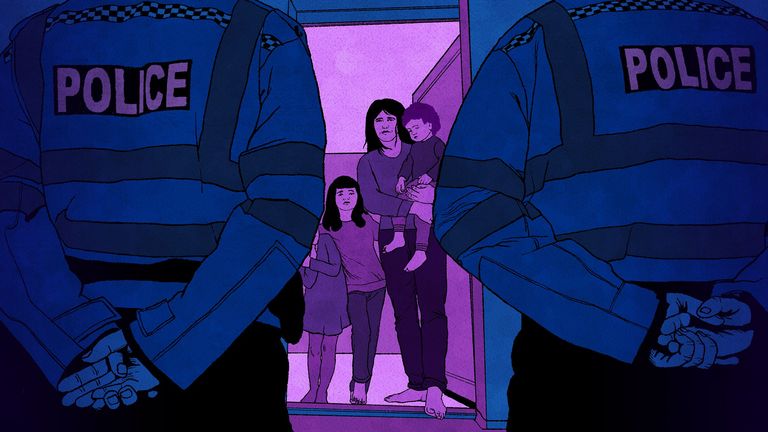Sarah* was a “smug married” woman with a “middle-class, middle-everything life”, before a knock on the door brought her world crashing down.
Early one morning, the day before her son’s birthday, she awoke to find police officers in her bedroom. Her husband was standing there with the police – their “really average” life would never be the same again.
“The first thing I knew, the doorbell was ringing,” she says. Shame-faced, her husband – who was always a stickler for following rules – said he had been arrested.
When she asked him why, he just replied: “Images.”
He was quickly escorted out by officers and taken away for questioning. Hundreds of indecent images of children had been found on his computer, including three Category A – the most serious.
As every corner of their home – cupboards, drawers, the attic and garage – was searched, a panicked Sarah asked the forensic officers if they wanted a cup of tea. Then a detective sat her down in their usually neat living room, and described the illegal images her husband had viewed in such detail it left her wondering if “they wanted to add to the shock value”.
She is still haunted by the memory of her two children crying, while police ransacked their house. “I didn’t really focus on them,” she says, her voice cracking. “In hindsight, I should have been with the children and ignored everything else.”
A working mother in her late-40s, Sarah is neatly dressed and well-spoken. The horror of that moment will never leave her, but she hopes that telling her story might help anyone going through something similar.
She sips a cup of tea, while reflecting on the nightmare that rocked her family’s life several years ago. Police, informally, call this type of arrest “The Knock”.
It is a raid on the home where every electronic and telecommunications device in the property is searched for, scanned on-site or confiscated.
All her photographs of her children from the day they were born to the day of the arrest were lost, Sarah says, because they were stored on the main computer, alongside the child abuse images.
After he was convicted, the judge ordered the computer to be destroyed.
Typically, warrants are executed early in the morning to reduce the chance of an offender destroying possible evidence. But that can make it more likely that children will be home at the time of arrest.
Read more:
‘My dad is a paedophile’: How families of sex offenders are falling through the cracks
For Sarah, the feeling of being judged was overwhelming. Their house was in a small cul-de-sac and she was certain her neighbours would call and ask what was going on: “It was obvious something big was happening in our house.”
But the phone never rang.
After his initial arrest that day, Sarah’s husband was bailed and returned to the family home. The pair sat down on the sofa and had a long conversation about the future. But a few hours later, social services arrived and told him to pack a bag and go.
“I was in a state of shock, the children were beside themselves. My husband was confused, and quite rightly, in a state of utter shame.”
Months of agonising followed but in the end Sarah decided to support her husband and keep the family together. While she would “never defend” what he did, she says, her children were a “huge factor” in her decision.
Her husband was eventually found guilty of viewing and copying more than 500 indecent images of children, aged 11 to 18. A year after their home was raided, he received a community sentence.
To help her cope, Sarah tried to understand what was going through his mind and what motivated him to look at those images. She also spoke to experts to find out how likely it was he would move from looking at images to offending against children.
She was psychologically tested and questioned by social services and other agencies, as they asked her to justify her choice. Her children also underwent questioning.
At the same time, Sarah says she and the children received no support for the trauma that had been caused to them by her husband’s crime, which new research shows can induce the same level of post-traumatic stress as war-zone combat.
“I felt so isolated,” she says. “They made it clear to me that I was unique in my decision.”
But anecdotally, police say around 50% of people choose to stay with their sex offender partners. “There must be more than me in the UK, that choose to stay as well? But how do you come across those people? Because nobody would ever, ever, talk about it openly,” she says.
In England and Wales, police forces make more than 850 arrests a month for online child sex offences. The majority of suspects are men who can have families living with them at the time of the offence.
Thousands of children every year now have to deal with the vicarious shame and stigma that’s associated with such a crime.
Dr Theresa Redmond, a professor for the eastern region policing institute at Anglia Ruskin University, describes the situation for those affected as a “high risk in terms of self-harm, suicide ideation”, especially once all the other emotional, financial and physical impacts are taken into account.
Many families, like Sarah’s, move home and put their children in different schools to avoid being targeted once the crime becomes known. But – whether or not partners choose to stay with the offender – there is no mandatory support for families.
“The police left some leaflets with my husband,” Sarah tells me, “for support for him.” For her and the children, she says, “There was nothing.”
Now, her family are trying to make a new start.
But the reality is wherever they go the shadow of her husband’s crime will always follow them: “If we go to a doctor’s appointment, it is on the file. If we go to the paediatrician, it’s on the file. The school, it’s on the file.”
Every time the doorbell rings, she feels a sense of dread. “I don’t answer the door anymore.”
She also harbours fears for the future implications of her choice to stay. Her children say they love their father and have forgiven him but she is worried about what happens when they grow up.
“If they have children and tell their partners what happened, will they then decide that my husband and I aren’t appropriate to get involved with their children?” she says, sounding fearful.
“I’ll never escape the choice I made.”
*Names have been changed
Anyone feeling emotionally distressed or suicidal can call Samaritans for help on 116 123 or email jo@samaritans.org in the UK. In the US, call the Samaritans branch in your area or 1 (800) 273-TALK





